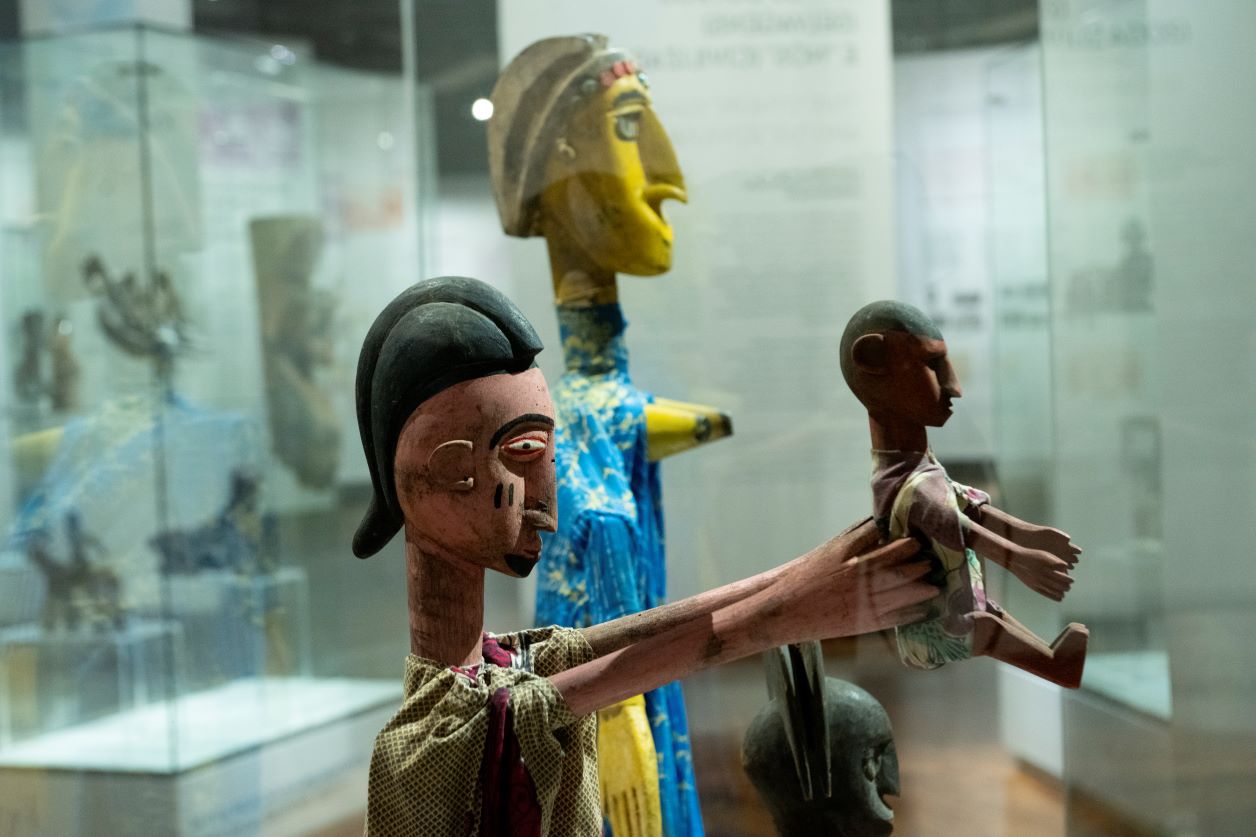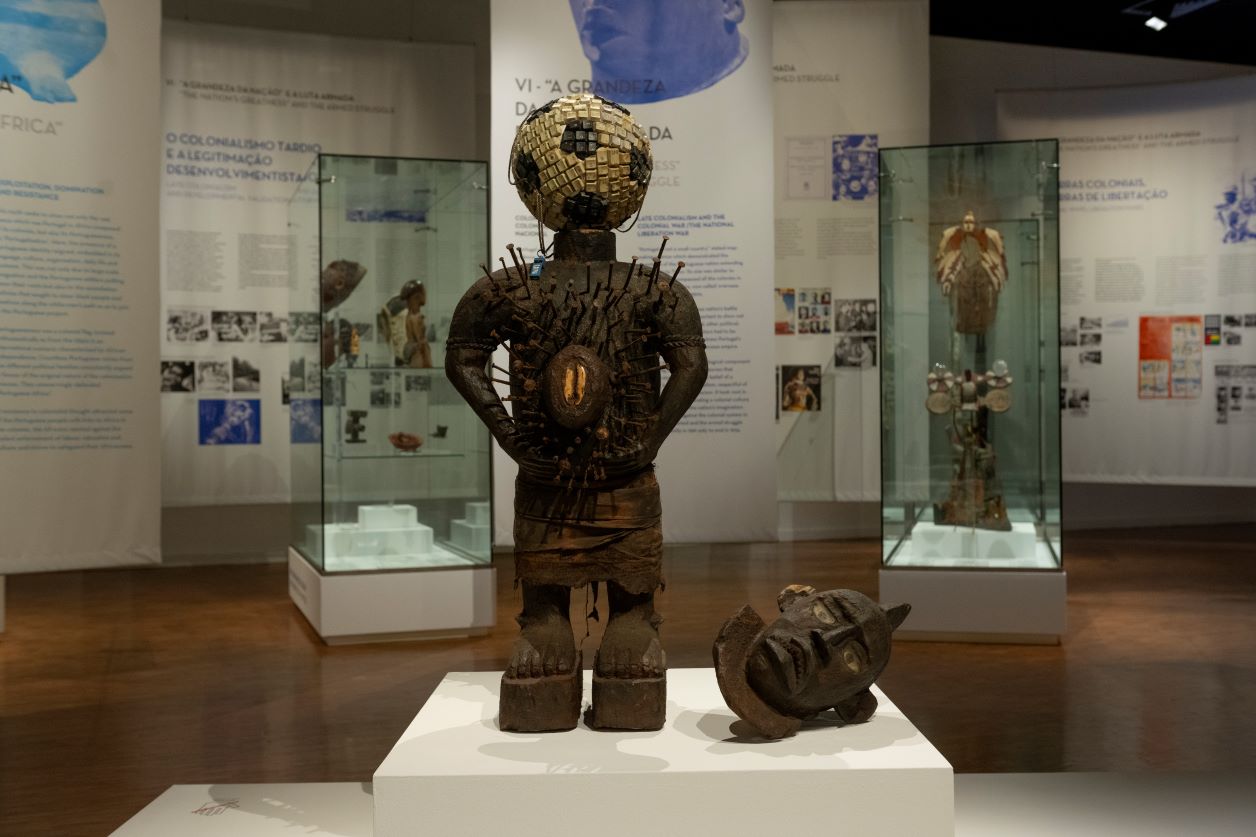Exhibition
Decolonizing the imaginaries
"Deconstructing Colonialism, Decolonising the Imaginary. Portuguese Colonialism in Africa: Myths and Realities" at Museu Nacional de Etnologia

An exhibition to decolonize Portuguese imagination and deconstruct the myths created by colonial ideology. Deconstructing Colonialism, Decolonising the Imaginary. Portuguese Colonialism in Africa: Myths and Realities is on display at the National Museum of Ethnology until November 2.
The exhibition Deconstructing Colonialism, Decolonising the Imaginary. Portuguese Colonialism in Africa: Myths and Realities, conceived and coordinated by historian Isabel Castro Henriques, is based on the premise that in “Portuguese society, characterized by the existence of systemic racism, there are currents of denial of racism resulting from myths associated with Portuguese colonialism, such as Lusotropicalism and the idea of a ‘good’ Portuguese colonialism”.
The exhibition, which aims to present the main lines of force of Portuguese colonialism in Africa in the 19th and 20th centuries, consequently has, in addition to the purposes of decolonizing the Portuguese imaginary and contributing to a renewal of knowledge about the Portuguese colonial issue, the objective of deconstructing the myths created by colonial ideology, destroying its falsifying nature.
A semicircular exhibition organization presents these fundamental myths and ideas in seven cores:
I – We have been in Africa for 500 years
The idea that Portugal had historical rights in Africa because it had discovered the Black Continent and maintained relations with the African people since the 15th century.
II – Colonizing mission and progress
The myth of the “civilizing mission” based on the idea of biological and civilizing superiority of the white man, associated with the progress of European actions that allowed the enlightenment and transformation of “savage” Africa.
III – Colonial vocation and historical mission
Use of science to construct the myths of the “colonial vocation”, characteristic of the Portuguese “race” and the “historical mission”, to justify the occupation of African territories and consecrate the singularity of Portuguese colonialism.
IV – The Others (Savages) and Us (Civilized)
The idea built on the opposition “primitive or savage”/“civilized or evolved” that legitimized the Luso-African relations of white superiority and black inferiority, as well as the harshness of the practices designed to ensure Portuguese domination over the colonized people.
V – Portuguese Africa
Myth that highlights a vast space that is Portugal in Africa, made up of its colonies, but also its “Portugalization”, where the presence of a Portuguese identity prevails, which is intended to be based on language, culture, organization and daily practices.
VI – The Greatness of the Nation and the Armed Struggle
The idea that “Portugal is not small”, based on cartographic science that showed the greatness of the Portuguese nation that stretched from Minho to Timor, presenting a dimension similar to that of Europe by encompassing all the colonies of the Portuguese empire designated, from the 1950s onwards, as overseas provinces.
VII – Decolonization, Independence and Legacies of Colonialism
Finally, the 13 years of armed struggle, physical and cultural destruction that ended on April 25, 1974, the complexity of the decolonization processes, the phenomena of military and social violence, the return of thousands of returnees and the construction of new political, cultural and economic relations with the new independent States are addressed.

Two central axes structure the exhibition’s narrative. The first is organised in thematic panels, in which text and image are articulated, giving the word to historical knowledge. The second axis aims to “make African works of art speak”, as material evidence of African thought and culture, highlighting the organisational complexity of the social and cultural systems of these societies.
“African artistic productions, especially sculpted and painted forms, material translations of the thoughts and cultures of the populations, integrated into all their daily lives, from domestic practices to the most diverse religious and festive rituals, not only ‘say’ Africa, but also highlight the creative capacity, wisdom, institutional and social rationality and cultural wealth of Africans, contributing powerfully to affirming African identities and civilizing practices”, highlights Isabel Castro Henriques.
This second axis of the exhibition is formed by a selection of 139 works, divided into six themes: symbols of authority; sacralization of life; everyday: work, production, commerce; cultures, arts and techniques; family, social relationships, identity; Africa Europe; cultural syntheses. The works come from the collections of the National Museum of Ethnology, including some pieces on deposit from the Calouste Gulbenkian Foundation and the collector Francisco Capelo, and works of contemporary African art by the artists Lívio de Morais, Hilaire Balu Kuyangiko and Mónica de Miranda.
As part of the parallel programme that complements the exhibition, which will be on display until November 2025, the Cinema and Decolonisation cycle will take place at ISEG and the National Museum of Ethnology, with screenings of films related to the post-colonial reality, in addition to other scientific activities, namely conferences and colloquia.
Françoise Vergès, a French political scientist, historian, and specialist in postcolonial studies, wrote in the book Decolonizar o Museu (Orfeu Negro, 2024) “truly decolonizing the museum means putting into practice a ‘program of absolute disorder’, it means making an effort of imagination and creating other ways of narrating and understanding the world, which nourish collective creativity and bring justice and dignity to the populations that have been dispossessed of them”.
Deconstructing Colonialism, Decolonising the Imaginary. Portuguese Colonialism in Africa: Myths and Realities is an important exhibition that takes a firm step forward on that long road ahead.